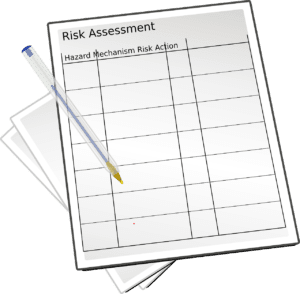Health and safety for events can often be the one part of the planning process that event organisers forget.
In this post, we are going to take a look at just what you need to know about effective health and safety at events.
Billetto is a ticketing platform that helps you manage, promote, and host events. Set up an event page and start selling tickets in 5 minutes.
CREATE YOUR EVENT >>
Key things to consider for health and safety at events
When organising your event, health and safety should be your number one priority. You’ll need to think about the following things.
Who are you responsible for at your event?
The people you are responsible for are not limited to just your guests. You also need to consider the people that work for you: permanent staff, contractors, or volunteers.
How big is the risk?
If there’s an increased risk of injury or accident at your event, you’ll need to do extra planning to minimise it.
Should something go wrong on your watch, you must have proper procedures in place to deal with it accordingly. If you don’t, and you are found to be in breach of health and safety regulations, you could face hefty fines of up to £20,000.
In the worst case, you may also face criminal charges. Planning and preparation are absolutely vital to ensure you have the right health and safety procedures in place.
What you need to prepare
As an event organiser, you are responsible for preparing a risk assessment, an emergency plan, and an event safety plan.
1. Risk assessment
No matter what type of event you are running, you’ll need to do a risk assessment in the initial planning stages.
This risk assessment will highlight any potential hazards that might affect your event.

A risk assessment should include things like:
- Will the noise be at an acceptable level?
- Are there any dangers of electrical cabling becoming damaged?
- What are the risks of fire?
- Could my lighting strobe trigger seizures?
- Are my temporary structures secure enough to hold the allocated guests?
- Is there an appropriate number of bathrooms for the number of guests?
- Do I have access to clean water?
- Will waste be managed correctly?
Being prepared for any situation will help ensure that your guests are safe and that everyone knows what to do if things go wrong.
Download this template and make a copy for each event that you are going to organise. Take time to fill it in and talk it over with your events team.
It’s also worth looking at this fire safety risk assessment.
Tip: Take a look at this in-depth guide on how to conduct a risk assessment, including practical examples for filling in the template.
2. Emergency plan
No event organiser ever wants to have to use their emergency plan, but it’s important to have one in case things go wrong.
An emergency could be anything from a fire to a flood to a bomb threat. How will you deal with this type of thing? How will you access support from the police, fire service, and ambulances if you need them?
All of your staff need to be aware of the emergency plan. Then they can assist with implementing it should the unforeseen happen.
You should prepare your emergency plan after first conducting the risk assessment. Then you’ll know more about the potential problems that could come up, and what you can do to prepare for them.
Tip: Here’s a guide to planning for incidents and emergencies at events.
3. Event safety plan
An event safety plan is yet another document you’ll need to complete, and it will typically include your risk assessment and emergency plan. It shows that you have thought about all the key health and safety aspects related to your event.
Depending on the type of event, venues and local authorities will want to see this safety plan while you are in the planning stages of your event. They’ll want to know that you are prepared for any situation that might arise.
You’ll also rely on this document in case anything bad happens during the event and you find yourself in a legal dispute.
Your safety plan should include:
- Details of your event : Where, when, what, detailed timings, venue plans, and so on.
- Who is in charge and other key contacts?
- Licences and permissions that you’ve obtained
- Risk assessment
- Emergency plan
- How event staff will communicate with each other
- Electricity control and supply
- Details regarding toilets, drinking water, and waste disposal
- Disabled facilities and access
- Noise levels and control
- How you will control traffic and crowds
- First aid and security details
- Information about any temporary structures, equipment, and attractions
- Food and beverage services: Who are they, what are they doing, and what licences do they have?
- How many staff in total and their duties?
Tip: Not sure where to start? “How to Write an Effective Safety Plan” will help you get on your way.
Health and safety guidelines for events
Health and Safety Executive (HSE) in the UK is the best resource that you can find for running events safely.

The HSE website has all the information you need on details such as:
- Crowd management
- Transport
- Fire safety
- Noise
- Employee welfare
- Using barriers
- Handling waste
- Special effects
- Venue design
- Falls from height
- Using temporary structures
For each of these, you’ll:
- Learn about your responsibilities as an event organiser.
- Find out the most important things you should know.
- Get links to additional resources that you might need.
Whether you are running an event for the first time or the tenth time, it’s a good idea to carefully look through the HSE website.
Tip: While aimed at music events, subscription-based The Purple Guide offers lots of relevant information on health and safety for events, including case studies and practical examples.
Are all health and safety aspects relevant to me?
All event organisers will have to consider health and safety for events. However, certain aspects are going to be different depending on the type of event.
For instance, a small art exhibition at a local gallery is going to look a lot different from a stadium event with five thousand guests. You won’t need to worry about temporary structures, hiring enough toilets, or waste management. You’ll only create a health and safety plan that fits the details of your event.
Similarly, events that involve alcohol or outdoor activities are going to be more prone to health and safety issues.
Tip: A good start is to search for “health and safety for [your event type]” to see if there’s already information available on the topic.
Where you can get help
All of this may seem rather daunting, especially if it’s your first time considering health and safety for events. Don’t worry though: There are plenty of resources to help and guide you along the way.
HSE’s “Getting started” article is extremely useful for first time event planners. You also have the following options.
Help from venues
Many venues will already have information on their websites aimed directly at event organisers. This info is there to help you ensure that everything is covered for your event, including health and safety measures.
If you don’t find anything on their website, ask them if they have existing information or checklists that will help. After all, it’s in their best interest to ensure that your event runs smoothly. They might even have prior experience with your type of event.
Help from local councils
Regional council sites like PeakDistrict.org.uk, Kingston.gov.uk, and Yorkshiredales.org.uk offer detailed information and checklists about health and safety for events. It’s worth checking the website for your local council or getting in touch with their representatives to see what details they can provide.

Help from consultants specialising in health and safety for events
You can also find companies who specialise in helping event organisers take care of health and safety aspects. Here are a few:
- Event Safety Plan provides safety support for event planners. The company offers training courses, consultation services, and online tools to guide you in meeting health and safety requirements.
- Stagesafe is a health and safety consultancy for primarily music events and live productions. They can assist with all health and safety documentation as well as inspections, emergency plans, and accident investigations.
- The Event Safety Advisors have worked with many well-known brands to create bespoke events. You can check out some interesting case studies on their website.
There are many similar consultancies, so you should be able to find one close to you.
Special considerations for large events
If you are holding a large-scale event and are concerned about crowd management, check out Crowd Safety for advice and planning help.
Due to the unfortunate risk of terrorism at large events, you should also consider the government’s “Crowded places guidance”.
Tip: This health and safety checklist from Northumbria University is a great example of specific details you might want to consider.
Billetto is a ticketing platform that helps you manage, promote, and host events. Set up an event page and start selling tickets in 5 minutes.
CREATE YOUR EVENT >>
Don’t skimp on your health and safety plan
While health and safety for events might seem like a bit of a chore at first, it’s absolutely vital to have the right plans in place.
The consequences of poor health and safety procedures can be devastating to you as an event organiser. It’s your responsibility to ensure you follow relevant guidelines and have an emergency plan in place.
By conducting a risk assessment and creating an event safety plan, you’ll ensure the safety of your staff and guests. Plus you’ll be prepared should anything bad happen during your event.





Leave a Reply